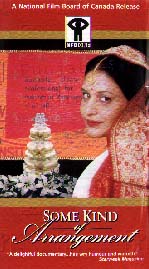|
________________
CM . . . .
Volume VI Number 7 . . . . November 26, 1999


|
Some Kind of Arrangement.
Ali Kazimi (Director). Geeta Sondhi (Producer).
Montreal, PQ: National Film Board of Canada, 1997.
43 min., 45 sec., VHS, $39.95.
Order number: C9197 140.
Subject Headings:
South Asian Canadians-Marriage customs and rites.
Matrimonial advertisements-Canada.
Grades 9 - 12 / Ages 14 - 17.
Review by Darleen Golke.
*** /4
|

Arranged marriages based on financial, political, religious, social, ethnic, linguistic or cultural
reasons have long been part of world culture. As the accompanying study guide suggests, "most
marriages are the result of some kind of arrangement." Focusing on three second-generation
Canadian young people of South Asian background, Preety Patel of Oakville, Hanif Abdul Karim
of Vancouver, and Rajni Kurichh of Ottawa, Some Kind of Arrangement explores the issue in
the nineties.
Preety, an accountant, enters an arranged marriage with Dimple, a young man from Nashville,
whom she has only met twice and spent a total of five days with before the marriage. "Sure, I had
the choice" about an arranged marriage she says. "It was a matter of me wanting to please the
parents as well as myself." Preety wanted financial independence but within the confines of her
culture. Details of the day before the wedding, the Hindu marriage rituals, the night before the
wedding, the ceremony, the final ritual, and the reception are presented. Two and one half weeks
after the wedding, she begins her married life in Nashville and learns, as do many brides, that
Dimple is not quite what she thought; however, she adjusts and accepts her choice.
After several unsuccessful years of searching for a mate, Rajni places ads in the matrimonial
classifieds: "Beautiful energetic Punjabi [woman] Canadian born and raised, 28, 5' 2", systems
business analyst, sincere, straight-forward, affectionate, fun-loving, zest for life. Excellent
East-West blend seeks compatible Hindu Sikh professional. Mutual respect and equality. Please
call or e-mail." She wants cultural compatibility, to be able to speak Punjabi with her children,
cook Indian food, and listen to Indian music. "A big part of me is Indian even though I've been
raised here," she admits. After more than 200 responses she has not met a suitable mate and is
discouraged. She decides to relocate to Silicon Valley that has a higher density of Indian men and
keep searching.
Hanif acknowledges that "I'm not sure what form of journey marriage will take because I
understand the singularity of the human condition. Yet I hope to create a kind of ambiance where
some kind of nourishing can take place." He travels to Toronto where his aunt, a matchmaker, has
arranged for him to meet four women. "This is, I think, the purpose of my life - some kind of
migration towards a wholeness, a completeness - an understanding of what it means to be
Muslim." Three months later and back home in Vancouver, he meets someone by chance and he
marries her.
The focus moves among the three young people and shows them interacting with their parents,
their families, their friends, and interviewers as well as sharing their feelings and experiences with
the audience. Each explains the reasons for the method used to find a partner. Preety chooses the
traditional arranged marriage, Rajni advertises in the personal classifieds, and Hanif enlists the
help of a matchmaker. None of the methods is perfect: Preety confesses some dissatisfaction
with Dimple's moodiness, Rajni is outraged when a seemingly excellent possibility insists on
driving her sport's car because he is "the guy," and Hanif becomes his own matchmaker.
However, each remains committed to the traditional ways of his/her culture rather than the mating
rituals of Westerners.
The point of view is decidedly pro-arranged marriages and offers those viewers firmly rooted in
the Western notion of romantic love and marriage another perspective. A guide with suggestions
for viewing and discussing the documentary with groups is provided. High school classes in family
studies, world religions, media studies, and social studies might find the themes of families and
relationships, of male and female roles, and of cultural practices applicable to their disciplines.
Some Kind of Arrangement aired on CBC's Witness in November, 1997, and received a
nomination for the 13th Gemini Awards.
Recommended.
Darleen Golke is the teacher librarian at Fort Richmond Collegiate in Winnipeg, MB.

To comment on this title or this review, send mail to cm@umanitoba.ca.
Copyright © the Manitoba Library Association.
Reproduction for personal use is permitted only if this copyright notice
is maintained. Any other reproduction is prohibited without
permission.
Published by
The Manitoba Library Association
ISSN 1201-9364
TABLE OF CONTENTS FOR THIS ISSUE - November 26, 1999.
AUTHORS |
TITLES |
MEDIA REVIEWS |
PROFILES |
BACK ISSUES |
SEARCH |
CMARCHIVE |
HOME
|
